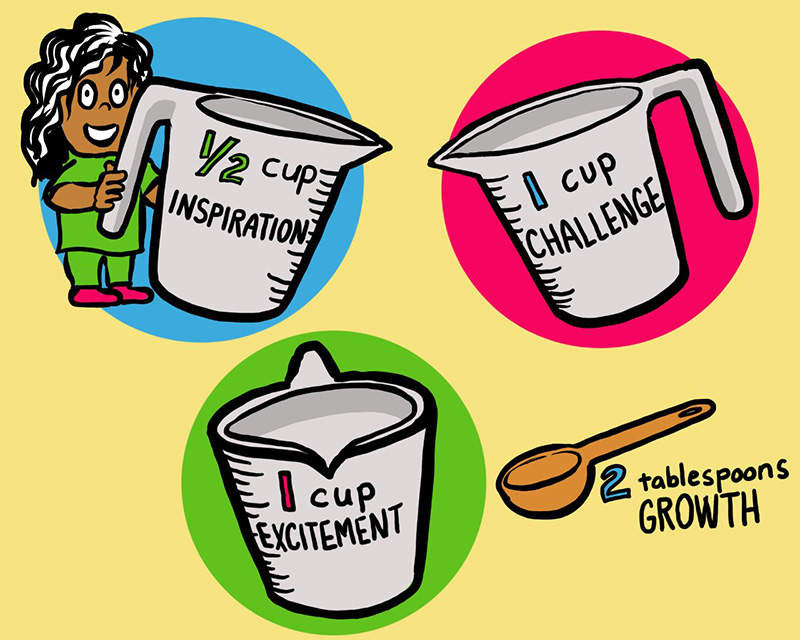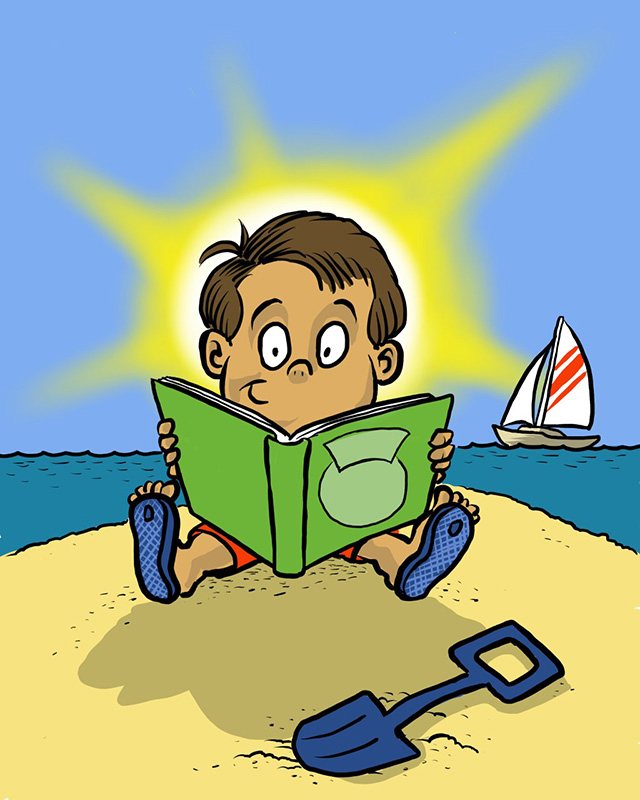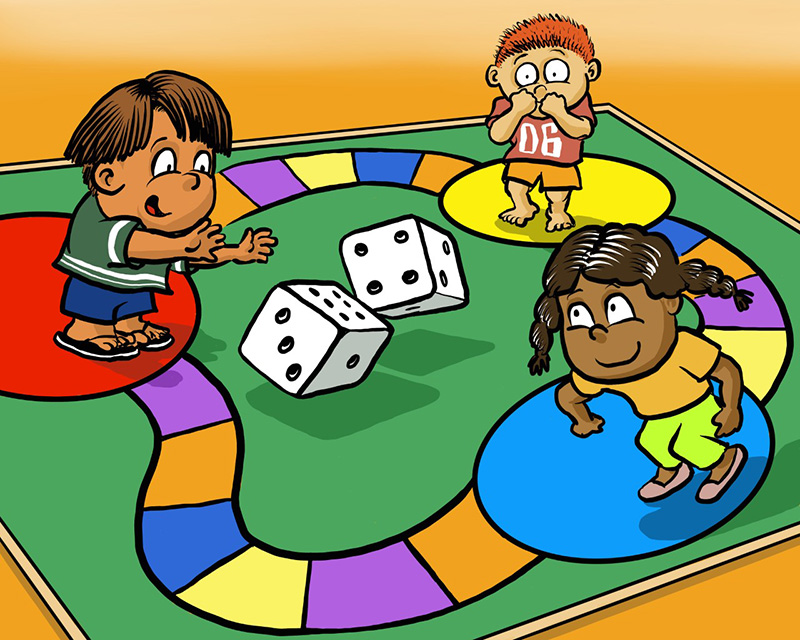Summer’s here, and the time is right for… helping our kids hold onto what they learned during this extraordinary year. “Summer slide”—the term for lessons lost or misplaced during the warmer months—responds well to simple, steady interventions. The kids may not be back in day care or PreK for quite a while, so we’ve gathered tips from top educators and researchers to help you shift gears from home schooling to summer vacation.

“Summer is a great time for parents and caregivers to do fun activities with children that can also promote learning. For example, cooking together and talking about measurement can connect math concepts for children. Helping children do art projects that involve marking out shapes with tape and then coloring them in with chalk is a good way to talk about geometry and shapes. Planting seeds with children is a great way to talk about science and how things grow. Finally, writing a children’s guide to summer fun together is a great way to promote writing and literacy and have fun together.”
—Megan McClelland, director of Oregon State University’s Hallie E. Ford Center for Healthy Children & Families; read her travel tips
“For young children, the most important skills that parents can build all come packaged in playful learning. Building with blocks and doing puzzles promotes spatial reasoning, a critical component of math. Playing games like Simon Says and engaging in pretend play fosters executive function skills (e.g., planning, self-control, memory). And talking about emotions and other mental states when watching movies or reading books can help boost social-emotional skills such as empathy and altruism.”
—Helen Shwe Hadani, Fellow, Metropolitan Policy Program, Anne T. and Robert M. Bass Center for Transformative Placemaking, The Brookings Institution

“There’s a well-documented antidote to slow and reverse the summer slide: kids who read, beat the summer slide! When kids don’t read over the summer, they fall further behind. The best thing that parents and caregivers can do is to let kids select books that interest them. And adults need to get involved, too, by modeling the behavior. So set aside family reading time. There is nothing better than ending your day by sharing stories with a child you love; it will change their lives—and yours, too!”
—Kyle Zimmer, President, CEO and Co-founder, First Book; read my interview with her
“Parents can prevent their child’s summer learning loss by reading a book every day. They can reread a child’s favorites often and add different storybook genres, such as fairy tales, folktales, fantasy and fables. Families can also engage in book talk during and after reading, act out the most exciting parts, make silly character voices, and discuss reasons why the book should become a new favorite. All these activities will build comprehension and vocabulary.”
—Kathy Hollowell-Makle, Executive Director, District of Columbia Association for the Education of Young Children
“There are three simple activities parents and caregivers of young children can do to slow and reverse the effects of summer slide: (1) Talk together and use words to describe the things you do and see around you; (2) read books every day and take time to discuss the stories and characters; and (3) sing your favorite songs. Children are naturally curious and love to play, so parents can follow their child’s interests to spark new conversations, stories, songs and games to enjoy together!”
—Jane Park, Director, Too Small to Fail, the early learning program of the Clinton Foundation; read about her organization’s laundromat-based literacy programs
—David Lawrence Jr., Chair, The Children’s Movement of Florida; read about the organization’s partnership with Waterford UPSTART
“Investigate programming options in your area; we’re hearing about many districts and non-profits across the country planning special programs this summer. Don’t forget your local library’s programs, and be sure your child is checking out books and you’re talking with them about the books. If you’re not sure, a librarian can help you choose age-appropriate titles. And always, always, always, talk with your children about anything and everything.”
—Claudia Miner, Executive Director & Cofounder of Waterford UPSTART

“Parents should make sure they approach reading as fun reading, meaning let kids pick any type of book they want about any topic they are interested in and letting them choose the genre—graphic novels, chapter books, picture books, etc. The other thing that can help with the summer slide in terms of math is playing more board games at home, particularly those that involve counting money. But there are also board games that are specifically focused on math activities. Another important thing to remember is that having family conversations about world events and history are important ways to foster children’s critical thinking skills and language expression.”
—Stephanie Currenton-Jolly, Director of Ecology of School Readiness Lab
Tip: Stay for the Stars!
While this list of adventures offers tips and activities for making merry this summer, remember that brain building is really all about the conversation you have with your kids: the give and take, the back and forth, the listening to and learning about what your child loves. What does your child love?
This time in quarantine is perfect for reclaiming the wonder of summer and of childhood. Something as simple as making bark rubbings of your favorite trees, watching ants march from hill to hill, and talking about how the breeze feels on your arm can start a conversation.
As our physicist friend, Steve Crandall, says: “Anyone can watch a sunset; stay for the stars!” We encourage you to dive into these 10 adventures… and stay for the science!
- Sign up for 8 weeks of Camp Tinkergarten to create your own virtual camp with play areas, a mud kitchen, camp songs, games, a trail map and activity guide, plus book lists and creative rituals to make summer sizzle. It ends with an awesome virtual camp out with families from across the country! Download the Camp Tinkergarten Set-Up Guide. (Free)
- Venture into 30 awesome quests of TEDEd’s Earth School to celebrate, explore and connect with nature. (Free.)
- It’s planting season. Help kids connect with nature and food through gardening.
- Cook with kids in quarantine: Delicious, healthy and oh-so-fun. With 7 kid-tested recipes!
- Create your own book game and explore questions from First Book.
- Investigate these simplest of tips from Adelphi University prof MaryJean McCarthy, designed to inspire, refresh and reclaim the wonder.
- Go chasing rainbows and build community while social distancing.
- Explore ELN’s 3-part series: Building Young Brains When Schools Are Closed: Outdoor Tips and Activities; Online Tips and Activities; and Offline Tips and Activities.
- It’s a big universe out there. Try these three tips from author, and children and nature advocate, Richard Louv, to help kids connect with nature.
- Make every place a playful learning landscape.
Learn more about the Science:
- Visit Vroom for more than 1000 science-fueled meal time, bath time, bed time and play time brain-building tips and activities.
- What are the seven essential executive-function Life Skills children need to thrive? It’s not magic; it’s science! Get them at Mind in the Making.
- Video: Want to Teach Math? Play Games with Geetha Ramani!
- Learn more about tackling the play deficit and why it’s so vital.
- Video: The Skills and Tools of Self-Regulation with Megan McClelland.
- Video: How did “play” became a four-letter word with Roberta Michnick Golinkoff and Kathy Hirsh-Pasek. Part 1. Part 2.





